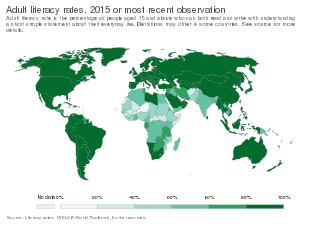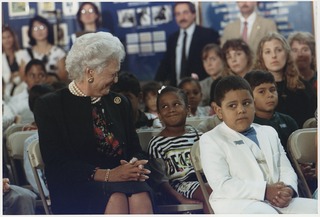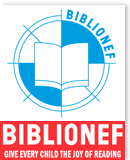
Literacy is the ability to read and write. Some researchers suggest that the study of "literacy" as a concept can be divided into two periods: the period before 1950, when literacy was understood solely as alphabetical literacy ; and the period after 1950, when literacy slowly began to be considered as a wider concept and process, including the social and cultural aspects of reading and writing and functional literacy.

The Free Library of Philadelphia is the public library system that serves the city of Philadelphia, Pennsylvania. It is the 16th-largest public library system in the United States. The Free Library of Philadelphia is a non-Mayoral agency of the City of Philadelphia governed by an independent Board of Trustees as per the Charter of the City of Philadelphia. The Free Library of Philadelphia Foundation is a separate 501(c)(3) non-profit with its own board of directors and serves to support the mission of the Free Library of Philadelphia through philanthropic dollars.

A bookmobile, or mobile library, is a vehicle designed for use as a library. They have been known by many names throughout history, including traveling library, library wagon, book wagon, book truck, library-on-wheels, and book auto service. Bookmobiles expand the reach of traditional libraries by transporting books to potential readers, providing library services to people in otherwise underserved locations and/or circumstances. Bookmobile services and materials, may be customized for the locations and populations served.

The World Book Capital (WBC) is an initiative of UNESCO which recognises cities for promoting books and fostering reading for a year starting on April 23, World Book and Copyright Day. Cities designated as UNESCO World Book Capital carry out activities with the aim of encouraging a culture of reading in all ages and sharing UNESCO's values. The nomination does not provide a financial prize.
Family literacy is a method of education. Relatively new, family literacy is being put into practice in the United States, Canada, and South Africa.

A school library is a library within a school where students, and sometimes their parents and staff have access to loan a variety of resources, often literary or digital. The goal of a school library or media center is to ensure that all members of the school community have equitable access "to books and reading, to information, and to information technology". A school library or media center "uses all types of media. .. is automated, and utilizes the Internet [as well as books] for information gathering."

The South San Francisco Public Library is located in South San Francisco, California. It is an independent city library and part of the Peninsula Library System, a consortium of city, county, and community college libraries in San Mateo County. The library holds approximately 166,000 volumes and has 29,000 borrowers. In the fiscal year 2007–2008, the library circulated 687,000 items. The library provides access to homebound delivery services, numerous children's programs, a literacy program, a community learning center, 77 public computers, and free Wi-Fi.

The most recent comprehensive data on adult literacy in the United States come from the Program for the International Assessment of Adult Competencies (PIAAC) study conducted in stages from 2012 to 2017 by the National Center for Education Statistics (NCES). English literacy test results from 2014 suggest that 21% of U.S. adults ages 16 to 65 score at or below PIAAC literacy level 1, meaning they have difficulty "[completing] tasks that require comparing and contrasting information, paraphrasing, or making low-level inferences." Included in that 21% is the 4.2% of respondents who were unable to be assessed due to language barriers, cognitive disability, or physical disability. A 2020 study by the Gallup analysis company funded by the Barbara Bush Foundation for Family Literacy estimated that getting all U.S. adults to at least PIAAC literacy level 3 proficiency would raise American's incomes by $2.2 trillion.
Kitengesa Community Library is a small and successful library in central Uganda. It is part of the Uganda Community Libraries Association and the Friends of African Village Libraries. It received international attention in October 2010 when BBC correspondent Mike Wooldridge did a special report on it for BBC News.
Susan Neuman is an educator, researcher, and education policy-maker in early childhood and literacy development. In 2013, she became Professor of Early Childhood and Literacy Education, and Chair of the Department of Teaching and Learning at NYU's Steinhardt School of Culture, Education, and Human Development.
A sighted child who is reading at a basic level should be able to understand common words and answer simple questions about the information presented. They should also have enough fluency to get through the material in a timely manner. Over the course of a child's education, these foundations are built on to teach higher levels of math, science, and comprehension skills. Children who are blind not only have the education disadvantage of not being able to see: they also miss out on the very fundamental parts of early and advanced education if not provided with the necessary tools.
The National Book Trust of Uganda (NABOTU), founded in 1997, is a non-government organization that brings together associations and institutions within Uganda's book sector to promote authorship, publishing and a culture of reading in Uganda.
Child Aid is a 501(c)(3) non-profit based in Portland, Oregon, working to promote literacy in Latin America. According to Child Aid's mission statement, the organization works to "create opportunity for Latin America's rural and indigenous poor through childhood literacy and education programs."
Worldreader is a 501(c)(3) global nonprofit organization working with partners to get children reading at least 25 books a year with understanding.
The Harold Grinspoon Foundation (HGF) is a private foundation established in 1993 and located in Agawam, Massachusetts. It is a 501(c)(3) nonprofit organization charitable organization with the goal of "enhancing Jewish and community life in Western Massachusetts, North America, Israel, and beyond."

The Literacy Coalition of Palm Beach County is a nonprofit organization headquartered in Boynton Beach, Florida. Its stated mission is to improve literacy in Palm Beach County. One in seven adults in Palm Beach County is unable to read and understand information found in books, newspapers, magazines, brochures and manuals. The organization's operates with the assistance of over 9,000 volunteers. In 2013, the Literacy Coalition provided services to more than 25,000 adults, to children and families.

Biblionef is a book donation non-profit organisation based in several countries: Netherlands, South Africa, France, Dutch Caribbean, Flanders, Suriname and Ghana. Biblionef donates new storybooks to under-privileged children and adolescents. The organisation donates books to institutions like schools, day care centres, crèches and other organisations with an educational focus in informal settlements and rural areas.
A book desert is a geographic area where printed books and other reading material are relatively hard to obtain, particularly without access to an automobile or other form of transportation. Some researchers have defined book deserts by linking them to poverty and low income, while others use a combination of factors that include census data, income, ethnicity, geography, language, and the number of books in a home.
The African Storybook (ASb) is a multilingual literacy initiative that works with educators and children to publish openly licensed picture storybooks for early reading in the languages of Africa. An initiative of Saide, the ASb has an interactive website that enables users to read, create, download, translate, and adapt storybooks. The initiative addresses the dire shortage of children's storybooks in African languages, crucial for children's literacy development. As of March 2023, the website had 3 800 original titles, 7 266 translations and 236 languages represented.
The Ghana Library Authority, established in 1950 as the Ghana Library Board, was the first public library service in sub-Saharan Africa. The public library movement in Ghana began in 1928, as a personal effort of the then Anglican Bishop Orfeur Anglionby of Accra. In 1946, the Aglionby Library Management Committee worked with the British Council Advisory Committee, towards library development in the then Gold Coast. In 2018 President Nana Addo Dankwa Akufo Addo appointed a Ghanaian Social Entrepreneur, Hayford Siaw as GhLA Chief Executive Officer. In May 2021, the Authority was shortlisted for the LBF International Excellence Awards in the 'Library of the Year' Category.








